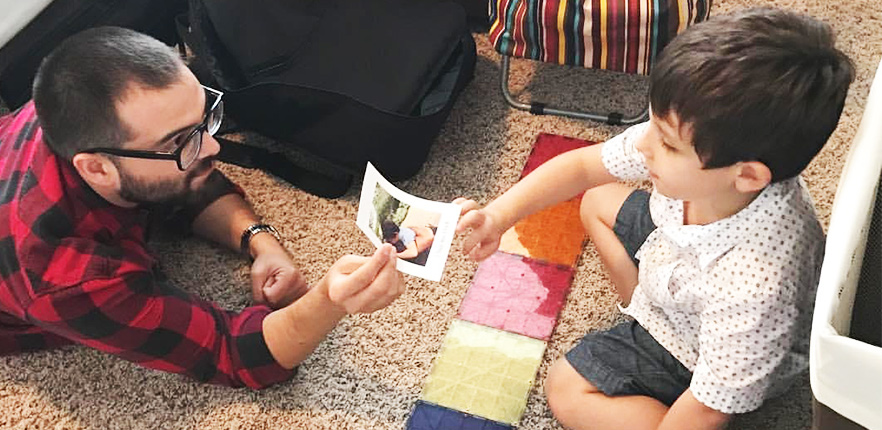Service to Others Through the Arts
A UIW Music Therapy Tradition of Alumni Supervising Current Students
By Cathy Befi-Hensel, BM ’10, PhD, MT-BC
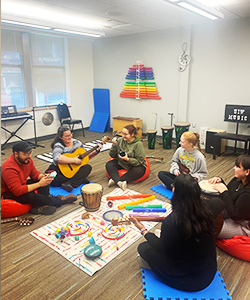 Music therapy stands at the intersection of artistry and healing, providing a powerful service to individuals through therapeutic music interventions. Simply put, the field of music therapy is one of service to others through the arts. Those proud to call themselves music therapists must undergo rigorous training that involves a study of the musical arts, as well as psychology. To graduate and sit for the national board certification exam, students must demonstrate proficiency in using piano, voice, guitar and percussion to facilitate therapeutic interventions based on individual client needs. As part of their training, students in UIW’s music therapy program are also required to complete a minimum of 180 hours of pre-internship fieldwork training across four different clinical placements in the greater San Antonio area, as well as a six-month internship. This structure allows UIW’s music therapy students to graduate ready to serve, equipped with extensive hands-on experience from clinical sites that include school districts, medical and psychiatric facilities, community centers, private practice and the Music Therapy Services Center (MTSC) on the UIW Broadway campus.
Music therapy stands at the intersection of artistry and healing, providing a powerful service to individuals through therapeutic music interventions. Simply put, the field of music therapy is one of service to others through the arts. Those proud to call themselves music therapists must undergo rigorous training that involves a study of the musical arts, as well as psychology. To graduate and sit for the national board certification exam, students must demonstrate proficiency in using piano, voice, guitar and percussion to facilitate therapeutic interventions based on individual client needs. As part of their training, students in UIW’s music therapy program are also required to complete a minimum of 180 hours of pre-internship fieldwork training across four different clinical placements in the greater San Antonio area, as well as a six-month internship. This structure allows UIW’s music therapy students to graduate ready to serve, equipped with extensive hands-on experience from clinical sites that include school districts, medical and psychiatric facilities, community centers, private practice and the Music Therapy Services Center (MTSC) on the UIW Broadway campus.
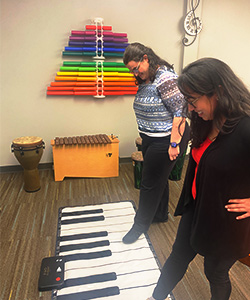 In the MTSC, located in the Luella Bennack Music Center, students practice under the supervision of Cathy Befi-Hensel, BM ’10, PhD, MT-BC, assistant professor and Music Therapy Program coordinator, offering pro-bono music therapy sessions to clients of all ages presenting a wide variety of needs. As part of the degree program, every music therapy student is assigned a client in the MTSC for at least one semester. In the past three years, the program has grown exponentially, with the weekly client list increasing from two to nine clients, plus a healthy waitlist of potential clients.
In the MTSC, located in the Luella Bennack Music Center, students practice under the supervision of Cathy Befi-Hensel, BM ’10, PhD, MT-BC, assistant professor and Music Therapy Program coordinator, offering pro-bono music therapy sessions to clients of all ages presenting a wide variety of needs. As part of the degree program, every music therapy student is assigned a client in the MTSC for at least one semester. In the past three years, the program has grown exponentially, with the weekly client list increasing from two to nine clients, plus a healthy waitlist of potential clients.
“There’s a strong demand for music therapy services in San Antonio,” explained Befi-Hensel. “Since our capacity is limited by our number of students, we try to give priority to clients who would otherwise not have access to music therapy services. In addition to expanding access to much-needed services, we give our students an opportunity to truly live the University’s Mission and make a difference as part of their studies here.”
The music therapy program’s impact goes beyond the walls of the MTSC. Students conduct fieldwork across the city every day – some are fortunate enough to be conducting their field placements with UIW alumni, who enjoy mentoring the next generation of the University’s future music therapists. Of the 19 UIW music therapy students in clinical fieldwork placements this semester, 13 are practicing under alumni supervision. “Our alums love to give back,” says Befi-Hensel. “We have six alumni supervisors this semester and nearly 10 others who have supervised students in the recent past. In fact, ‘when and how do I take on a student?’ is probably the most common question I get asked when new alumni start working.”
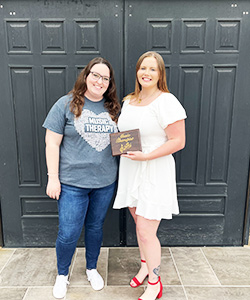 Courtney Moore, BM ’17, MT-BC, a board-certified music therapist who studied at UIW, is one of six UIW music therapy alumni who are currently supervising the fieldwork placement of current UIW students. She originally chose UIW for her undergraduate studies because she liked the small school atmosphere where professors and students could get to know each other. Her love for the University and its offerings grew as she went further down her degree path and found her passion in the service she provided others during her internships. For her, that spirit of service didn’t end with graduation.
Courtney Moore, BM ’17, MT-BC, a board-certified music therapist who studied at UIW, is one of six UIW music therapy alumni who are currently supervising the fieldwork placement of current UIW students. She originally chose UIW for her undergraduate studies because she liked the small school atmosphere where professors and students could get to know each other. Her love for the University and its offerings grew as she went further down her degree path and found her passion in the service she provided others during her internships. For her, that spirit of service didn’t end with graduation.
“I love being able to be there for students,” she says. “I have been supervising for about a year now and enjoy it immensely. Helping to mold upcoming therapists has been a true passion of mine.” Her advice to UIW’s current music therapy students is to trust their instincts and lean on their supervisors for support. “Everything you have been doing is going to prepare you for your upcoming career.”
Anna Bocanegra, BM ’21, MT-BC, has also been supervising students for about a year. “I really enjoy having new perspectives and guiding others,” says Bocanegra. “I always feel like I have the opportunity to not only teach, but learn from those I teach as well.”
A first-generation college student, Bocanegra chose UIW because of its proximity to her roots in the Rio Grande Valley and for its robust offerings. “I also wanted a college that would have the time and resources to help me with this journey and to be given opportunities for leadership, service and community.” Her advice for current and future music therapy students is to keep going. “Being a student in this field is challenging, especially when some people don’t believe in mental health or support the arts, but I know that despite this, our profession is highly sought after and has done wonderful things for people in many populations. Keep going and don’t be afraid of any challenges in your way because they are just bumps on this amazing journey.”
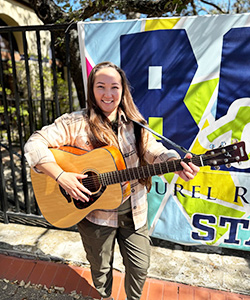 Another proud alumna, Vanessa Tomlin, BM ’10, MT-BC, has been supervising students for eight years. “In high school, I was interested in counseling and heard about music therapy from my band director,” she says. “Being a musician, it was a perfect fit for me. Now, working with students keeps me on my toes and brings in a fresh perspective.”
Another proud alumna, Vanessa Tomlin, BM ’10, MT-BC, has been supervising students for eight years. “In high school, I was interested in counseling and heard about music therapy from my band director,” she says. “Being a musician, it was a perfect fit for me. Now, working with students keeps me on my toes and brings in a fresh perspective.”
Mike Deosade, BM ’12, MT-BC, has been supervising students for 10 years and shares Tomlin’s sentiments on welcoming soon-to-be music therapists from UIW to learn from him. Working primarily with interns, he has found that they inspire him and expand his perspective on clients. “Each intern leaves a small but greatly appreciated and lasting difference in my practice,” he says. His advice to current students is to practice from a place without judgment. “I would advise students not to see people with diagnoses as being ‘broken and needing to be fixed,’ but to see them as whole and beautiful beings who just do things differently.”


